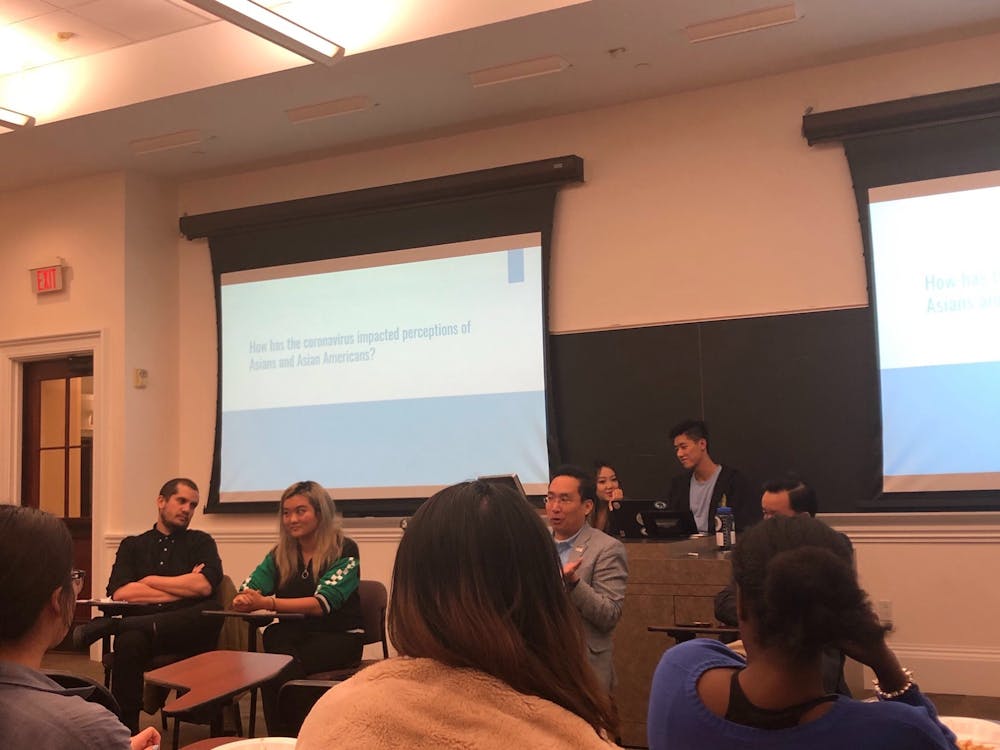Panel discusses xenophobia sparked by coronavirus

After six Rice Alert emails about the novel coronavirus COVID-19 and rising fear about the spread of the disease, student clubs on campus organized to address another aspect of COVID-19: xenophobia toward Asians and Asian Americans. Last Thursday, faculty members and students gathered to listen to panelists speak about the topic and offer potential solutions.
The event, co-hosted by the Asian Pacific American Student Alliance and the Chinese Student Association, featured four panelists associated with Rice and the University of Houston. Alina Zhu, an undergraduate from Shanghai, China, spoke about xenophobic incidents she witnessed on campus that she had previously mentioned in a Thresher op-ed, such as a professor asking a Chinese student to stop coming to class.
“I think a lot of us can be put in uncomfortable situations,” Zhu, a Will Rice College sophomore, said. “I don't know how many times, if I cough, I hear someone say, 'Hope you don't have the coronavirus.' Recognizing that even at an institution like this ... discrimination against Chinese students is still too common.”
Panelists compared the xenophobic reactions to COVID-19 to previous racist incidents, such as the Angel Island Immigration Station and the Chinese Exclusion Act.
“Everyone from this whole section of the globe was kept out because of the stereotypes and sentiments — that these people are different from us, and therefore they bring disease or they eat dogs,” Stephen Chao (Will Rice '02), a family physician, said.
English professor Alden Marte-Wood said that rhetoric around closing borders and restricting travel reflects the racism towards Asians and Asian Americans seen throughout history.
“What's fascinating is ... the subtle ways in which these kinds of rhetoric from the past get transformed and reemerge in relatively innocuous ways, ways you might not necessarily associated with outright xenophobia [or] blatant racism,” Marte-Wood said. “We're hearing the kind of rhetoric — that what needs to happen is insularity — exclusion to keep everything out.”
Marte-Wood also said that fear around COVID-19 can be traced back to general anxiety in America in the 21st century.
“Think about the slippage between the terms fear and anxiety ... when you read something — public policy, the newspaper, a YouTube clip, a meme ... symptoms [of anxiety] are emerging,” Marte-Wood said. “So if you think about the fear around COVID-19 [and] relate it to anxiety, it's also an expression, a manifestation, a symptom of certain kinds of 21st century American … anxiety.”
Panelists agreed that American education has not done enough to inform Americans about the discrimination historically faced by Asian Americans. Panelist An Nguyen, an Asian studies professor at the University of Houston, emphasized the need for shifts in higher education, in particular in hiring tenure-track faculty in Asian studies.
“When I got this gig at the University of Houston, I was so happy,” Nguyen said. “48,000 students — 17 percent of a student body of Asian descent. [But] the Center of Asian American Studies over there has existed for 26 years ... and they have never, ever hired a full-time faculty [trained] in Asian American studies or ethnic studies.”
While the Thresher cannot confirm the full history of hiring at the UH, there are currently no full-time tenured professors at the center and the center only offers a minor in Asian Studies.
After over an hour of conversation, audience members were asked to make comments or raise further concerns.
Peter Wang, the vice president of APASA, said that he began to plan the event with co-president Jiayi Sun after seeing a viral post about the virus from University of California, Berkeley. The post in question lists “xenophobia” as a “common” and “normal” reaction to disease outbreak.
“The overall discourse about the coronavirus, jokes and comments made toward Asians and Asian Americans inspired us to host an event,” Wang, a Sid Richardson College junior, said.
More from The Rice Thresher
Rice establishes international travel incident response team
Rice announced the creation of the International Travel Incident Response Team in a campus-wide email April 1. The move comes amid federal pressures on international travel and an increased immigration law enforcement on university campuses.
Vegan Fest returns after six year hiatus
Vegan Fest was celebrated at Rice in the RMC Grand Hall March 25. The event, hosted by Rice Vegan Society, welcomed 25 vendors and organizers for around 610 attendees, according to events coordinator Hong Lin Tsai.

Engineering school celebrates 50th anniversary, invites students, alumni and speakers
The George R. Brown School of Engineering invited engineering alumni, students and faculty to celebrate its 50th anniversary March 28-29. The event, which took place in the Engineering Quad, included speakers, a drone show, alumni gatherings and other social events like mixers.


Please note All comments are eligible for publication by The Rice Thresher.